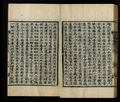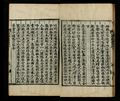"(Translation) 李睟光 外國4"의 두 판 사이의 차이
(→Original Script) |
|||
| (사용자 5명의 중간 판 22개는 보이지 않습니다) | |||
| 3번째 줄: | 3번째 줄: | ||
|English = | |English = | ||
|Chinese = 芝峯類說 | |Chinese = 芝峯類說 | ||
| − | |Korean = 지봉유설(''Jibongyuseol'') | + | |Korean = [http://kostma.korea.ac.kr/viewer/viewerDes?uci=RIKS+CRMA+KSM-WZ.1614.0000-20090713.AS_BC_269&bookNum=&pageNum= 지봉유설(''Jibongyuseol'')] |
|Genre = [[Literati Writings]] | |Genre = [[Literati Writings]] | ||
|Type = | |Type = | ||
| 39번째 줄: | 39번째 줄: | ||
38. 晉書。肅愼氏。一名挹婁。在不咸山北。去扶餘可六十日。東濱大海。西接寇漫汗國。北極弱水。廣袤數千里。裨離國。在肅愼氏國西北。馬行二百日。養雲國。去裨離馬行又五十日。寇莫汗國。去養雲國又百 | 38. 晉書。肅愼氏。一名挹婁。在不咸山北。去扶餘可六十日。東濱大海。西接寇漫汗國。北極弱水。廣袤數千里。裨離國。在肅愼氏國西北。馬行二百日。養雲國。去裨離馬行又五十日。寇莫汗國。去養雲國又百 | ||
|| | || | ||
| − | ( | + | 37. In the ''History of Five Dynasties'' (五代史), five lands of Lu 盧<ref>also written as 吾盧, Yīwú 伊吾 or Yīwúlú 伊吾卢</ref> in the Western region “have no water, are always cold and have lots of snow. Every time the weather gets warm, the snow disappears and water is obtained from this."<ref>新五代史, Book 74. "Appendix on Four Barbarians" (四夷附录), 3: 34 |
| + | https://ctext.org/wiki.pl?if=en&res=626823&searchu=%E5%A4%9A%E9%9B%AA&remap=gb</ref> The Zhongyun 仲雲<ref>See | ||
| + | https://en.wikipedia.org/wiki/Hami | ||
| + | https://zh.m.wikipedia.org/wiki/仲云国</ref> region has no water, either. One can get moist sand by digging the ground, which he can place on the chest to quench thirst. Also in Zheng Xiao's (鄭曉, 1499-1566) “Wuxuebian“ 吾學編 (ca. 1522), the great sand river of the West can be 200-''li'' without water. Even if there is water, people cannot drink it. Feeding it to horses and cattle will always kill them. Taolaisi 討來思 is located in the middle of the sea. There is water beneath the mountain that is red in color like burning fire. This is also unusual. | ||
| + | |||
| + | 38. In the ''Book of Jin'' (晉書), the Sushen 肅愼 tribe, Yilou 挹婁 by another name, resides at the north of Buxian 不咸 Mountain. Going there from Buyeo 扶餘 can take sixty days. To the East, it is adjacent to the great sea. To the West, it shares borders with Koumanhan 寇漫汗 state. To extreme north is Ruoshui 弱水. The area is thousands of [square] ''li''. The state of Bei’er 裨離 is located to the northwest of the state of Sushen. By horse it takes 200 days. The state of Yangyun 養雲 is another 50-day distance by horse from Bei'er. The state of Kou-Mohan is another 100-day distance from the state of Yangyun 養雲. | ||
| + | |||
| + | |||
|- | |- | ||
| [[File:지봉유설권2외국13.jpg |border|지봉유설권2외국13|400px]] | | [[File:지봉유설권2외국13.jpg |border|지봉유설권2외국13|400px]] | ||
| 49번째 줄: | 56번째 줄: | ||
40. 稗史言回回國。事天事祖之外。無所崇。有詩曰僧言佛子在西空。道說蓬萊在海東。惟有孔門眞實事。眼前無日不春風。余謂回回在西域。而其言如此。以中華之士。而乃尚佛敎何也。回回文字。有篆草楷三樣。其曆法與中國僅差二刻。聞西南諸國。奉回回敎法者多云。蓋斥佛法而以事天爲重耳。又其俗善保養。常護外腎。使不着寒。夜臥以手握之 | 40. 稗史言回回國。事天事祖之外。無所崇。有詩曰僧言佛子在西空。道說蓬萊在海東。惟有孔門眞實事。眼前無日不春風。余謂回回在西域。而其言如此。以中華之士。而乃尚佛敎何也。回回文字。有篆草楷三樣。其曆法與中國僅差二刻。聞西南諸國。奉回回敎法者多云。蓋斥佛法而以事天爲重耳。又其俗善保養。常護外腎。使不着寒。夜臥以手握之 | ||
|| | || | ||
| − | ( | + | The state of Yiqun 一群 is another 50-day distance from Mohan. Estimated distance from Shushen is over 50,000 ''li''. During the reign of Jin Wudi (266-290), they each dispatched Xiaobu 小部 to pay tributes of local products. Adjacent to Mohe 靺鞨 of Hesui 黑水 (Black Water) is the Sushen 肅愼 tribe. Hesui is today’s Helungjiang (Black Dragon River). |
| + | |||
| + | 39. It says in the ''History of the Five Dynasties'', | ||
| + | “In the sea to the east of Khitan 契丹 is Tiedian 鐵甸. ... Its land has little plants. The water is salty and dirty as blood.”<ref>新五代史, Book 73. "Appendix on Four Barbarians" (四夷附录), 2: 14 | ||
| + | https://ctext.org/wiki.pl?if=en&chapter=158998&remap=gb#p15</ref> | ||
| + | “To the north there are Niuti Tujue 牛蹄突厥 (Ox-hoof Turks), with human bodies and ox-hooves.” <ref>新五代史, Book 73. "Appendix on Four Barbarians" (四夷附录), 2: 15 | ||
| + | https://ctext.org/wiki.pl?if=en&chapter=158998&remap=gb#p16</ref> | ||
| + | ”And in the Gouguo 狗國 (Dog-land) in the north, [people] have human bodies and dogs’ heads, are long haired and unclothed. Their language is a canine haul. At birth, the men become dogs and women become humans.” <ref>Ibid.</ref> | ||
| + | ”To the northeast, one reaches Wajieji 襪劫子—its people are good archers. If they meet a person, they immediately kill him and eat him raw.”<ref>Ibid.</ref> | ||
| + | "Khitan had dispatched ten people. Carrying dry barley powder, they traveled north for one year, past forty-three cities. Many residents used barks of trees for housing. As there was no interpretor of their language, the names of the country were unknown. Their land bordering the plane was temperate and [the land bordering] the forest was cold and chilly. When they reached thirty-third city, they got one man who could speak Tiedian language. ‘From this point on, even a group of dragons, serpents, birds of prey, and ''chimei'' 魑魅 will not be able to go [any further].' Its north is an extremity of wasteland.” I call this the Northern steppes (北荒外: lit., ”beyond the northern wasteland”). How could one know there is another world there? Such is what is recorded in ''Sancai tuhui'' 三才圖會. | ||
| + | |||
|- | |- | ||
| [[File:지봉유설권2외국14.jpg |border|지봉유설권2외국14|400px]] | | [[File:지봉유설권2외국14.jpg |border|지봉유설권2외국14|400px]] | ||
| 96번째 줄: | 113번째 줄: | ||
|- | |- | ||
|} | |} | ||
| − | + | <!-- | |
=='''Discussion Questions'''== | =='''Discussion Questions'''== | ||
# | # | ||
| 103번째 줄: | 120번째 줄: | ||
=='''Further Readings'''== | =='''Further Readings'''== | ||
| − | + | ||
<div style="color:#008080;"> | <div style="color:#008080;"> | ||
* View together with '''~~'''. | * View together with '''~~'''. | ||
</div> | </div> | ||
| − | + | ||
* | * | ||
* | * | ||
| 119번째 줄: | 136번째 줄: | ||
==='''(sample) : Jaeyoon Song'''=== | ==='''(sample) : Jaeyoon Song'''=== | ||
---- | ---- | ||
| + | |||
| + | 49. 萬曆癸卯。余忝副提學時。赴京回還使臣李光庭,權憘。以歐羅巴國輿地圖一件六幅送于本館。蓋得於京師者也。見其圖甚精巧。於西域特詳。以至中國地方曁我東八道,日本六十州。地理遠近大小。纖悉無遺。所謂歐羅巴國。在西域最絶遠。去中國八萬里。自古不通中朝。至大明始再入貢。地圖乃其國使臣馮寶寶所爲。而末端作序文記之。其文字雅馴。與我國之文不異。始信書同文。爲可貴也。按其國人利瑪竇,李應誠者。亦俱有山海輿地全圖。王沂三才圖會等書。頗采用其說。歐羅巴地界。南至地中海。北至冰海。東至大乃河。西至大西洋。地中海者。乃是天地之中故名云。 | ||
| + | |||
| + | In the thirty-first year 1603 of Emperor Wanli's reign (1573-1620), when I was serving as the Vice Superintendent of Training, Yi Guangjeong and Gweon Hi who had visited Beijing brought home with them the six-panel screen atlas of European countries to the [Institute for the Advancement of Literature]. In general they obtained it from Beijing. To my observation, the atlas was delicate and precise, particularly in detail on the Western hemisphere. When it comes to the regions of China, the eight provinces of our eastern country, and the sixty prefectures of Japan, there was in general no serious lack of information. So-called European countries are farthest away among the Western hemisphere. Detached eighty thousand ''li'' from China, they had not contacted the the court of the central country [China] since antiquity. Only from the Great Ming Dynasty onward, they entered the tributary system once again. This atlas was created by the envoy of Europe Bing Baobao (??), to which he wrote the preface at the very end. Their writing system is refined and elegant, and different from the script of our country. | ||
| + | |||
| + | |||
| + | 50. 異聞志云天下無處非鬼充塞無間。獨互人國白玉城。以白玉爲之。鬼不敢入。蓋鬼陰物。喜黑而惡白耳。有人至此城得其故。歸以白石繞屋爲墻。時河間多疫癘。獨其家無染者。今人用白堊塗門。亦其遺意也。按後漢書。西域大秦國。以石爲城。列置郵亭。皆堊墍之云。互人。疑亦西域國名。 | ||
| + | |||
| + | |||
*Discussion Questions: | *Discussion Questions: | ||
| − | |||
==='''Student 1 : Ren, Ruixin'''=== | ==='''Student 1 : Ren, Ruixin'''=== | ||
| 410번째 줄: | 435번째 줄: | ||
37. 五代史。西域五盧地無水。而常寒多雪。每天暖雪消。乃得水。又仲雲界無水。掘地得濕沙。人置之胸以止渴。又吾學編。西域大沙河可二百里無水。卽有水。人不可飮。飮牛馬輒死。討來思在海中。山下有水。赤色如火燃。亦異矣。 | 37. 五代史。西域五盧地無水。而常寒多雪。每天暖雪消。乃得水。又仲雲界無水。掘地得濕沙。人置之胸以止渴。又吾學編。西域大沙河可二百里無水。卽有水。人不可飮。飮牛馬輒死。討來思在海中。山下有水。赤色如火燃。亦異矣。 | ||
| − | In the history of five dynasties, the Western region has the land of five Lu(盧)s with no flood/water, are always cold and have lots of snow. | + | In the history of five dynasties, the Western region has the land of five Lu(盧)s with no flood/water, are always cold and have lots of snow. 又仲雲界無水。Every time the weather gets warm, the snow disappears and water is obtained from this. One can get moist sand by digging the ground, which he can place on the chest to quench thirst. Also in Zheng Xiao's (鄭曉, 1499-1566) Wuxuebian 吾學編 (ca. 1522), the great sand of the West, the river can go 200-li without water. Even if there is water, people cannot drink it and feeding it to horses and cattle will always kill them. Taolaisi 討來思 is located in the middle of the sea. There is water beneath the mountain that is red in color like burning fire. This is also unusual. |
| − | |||
38. 晉書。肅愼氏。一名挹婁。在不咸山北。去扶餘可六十日。東濱大海。西接寇漫汗國。北極弱水。廣袤數千里。裨離國。在肅愼氏國西北。馬行二百日。養雲國。去裨離馬行又五十日。寇莫汗國。去養雲國又百"日。一群國。去莫汗又百五十日。計去肅愼五萬餘里。晉武時各遣小部。獻其方物。按黑水靺鞨。卽肅愼氏也。黑水。今黑龍江也。 | 38. 晉書。肅愼氏。一名挹婁。在不咸山北。去扶餘可六十日。東濱大海。西接寇漫汗國。北極弱水。廣袤數千里。裨離國。在肅愼氏國西北。馬行二百日。養雲國。去裨離馬行又五十日。寇莫汗國。去養雲國又百"日。一群國。去莫汗又百五十日。計去肅愼五萬餘里。晉武時各遣小部。獻其方物。按黑水靺鞨。卽肅愼氏也。黑水。今黑龍江也。 | ||
| − | In the book of Jin, | + | In the book of Jin, the Sushen 肅愼 tribe, Yilou 挹婁 by another name, resides at the north of Buxian/Bulham Mountain. Going there from Buyeo can take sixty days. To the East, it is adjacent to the great sea. To the West, it shares borders with 寇漫汗 state. To extreme north is Ruoshui 弱水. The area is thousands of [square] li. |
| − | The state of Bei’er is located to the northwest of the state of Sushen. | + | The state of Bei’er 裨離 is located to the northwest of the state of Sushen. By horse it takes 200 days. |
| + | The state of Yangyun 養雲 is another 50-day distance by horse from Bei’er. | ||
| + | The state of Kou-Mohan 寇莫汗 is another 100-day distance from the state of Yangyun. | ||
| + | The state of Yiqun 一群 is another 50-day distance from Mohan. Estimated distance from Shushen is over 50,000 li. | ||
| + | During the reign of Jin Wudi (266-290), they each dispatched Xiaobu to pay tributes of local products. Adjacent to Mohe of Hesui (Black Water) is the Sushen 肅愼 tribe. Hesui is today’s Helungjiang (Black Dragon River). | ||
| + | 39. 五代史曰。契丹東距海有鐵甸。其地少草木。水鹹濁如血。北有牛蹄突厥。人身牛足。又北狗國。人身狗首。長毛不衣。語爲犬嗥。生男爲狗女爲人。東北至襪劫子。其人善射。遇人輒殺而生食。契丹嘗遣十人。齎乾麨北行一年。經四十三城。居人多以木皮爲屋。其語言無譯者。不知國土名號。其地遇平地則溫和。山林則寒冽。至三十三城。得一人能鐵甸語云。自此以往。龍蛇猛獸魑魅群行。不可往。此北荒之極也。余謂此北荒外。安知又有世界。如三才圖會所紀者乎。 | ||
| − | + | It says in the History of the Five Dynasties, “In the sea to the east of Khitan is Tiedian. Its land has little plants. The water is salty and dirty as blood. To the north there is Niuti Tujue 牛蹄突厥 [Ox-hoof Türk], The people’s bodies have ox-hooves. Also at the Northern Europe, the people’s bodies have dogs’ heads. They are long haired and unclothed, their language is a canine haul, and men born there become dogs and women become humans. Its northeast reaches Wajieji—its people are good archers. If they meet a person, they immediately kill him and eat him raw. Khitan had dispatched ten people. Carrying dry barley powder, they traveled for one year, past forty-three cities. Residents were many and they used barks of trees for housing. As there was no interpretor of their language, the local names of the country were unknown. Their land bordering the plane was temperate and [bordering] the forest, it was cold and chilly. When they reached thirty-third city, they got one man who could speak Tiedian language. From this point on, even a group of dragons, serpents, birds of prey, and chimei 魑魅 will not be able to go [any further]. To the north of this point is an extremity of wasteland. I call this Beihuwangwai (the land beyond the northern wasteland). How could one know there is another world there? Such is what is recorded in Sancai tuhui 三才圖會. | |
| + | |||
| + | 40. 稗史言回回國。事天事祖之外。無所崇。有詩曰僧言佛子在西空。道說蓬萊在海東。惟有孔門眞實事。眼前無日不春風。余謂回回在西域。而其言如此。以中華之士。而乃尚佛敎何也。回回文字。有篆草楷三樣。其曆法與中國僅差二刻。聞西南諸國。奉回回敎法者多云。蓋斥佛法而以事天爲重耳。又其俗善保養。常護外腎。使不着寒。夜臥以手握之"令暖。謂此乃生人性命之本根。不可不保護。此說亦有理。回回或以爲古之大食國。非唐之回鶻,回紇也。余赴京時。見其國人。皆白布纏頭。亦詭矣。 | ||
| − | + | Some unofficial history mentions about Uighur. They serve Heaven and their ancestors, but have no subject of worship other than these. There is a poem that goes: | |
| + | Monks tell the disciples of Buddha are in the space/sky of the West; | ||
| + | Daoists explain Penglai Mountain is located in the East of the Sea; | ||
| + | Only there is the school of Confucius, things that are real; | ||
| + | There is not a day without spring winds before one’s eyes | ||
| − | + | I say Uighur is located in the West and told as such. | |
| + | As a Sinicized gentleman, what is it like to revere the teachings of Buddha? There are three types of Uighur script—the seal, the cursive, and the regular scripts. Its calendrical system has only two ke differences from the Chinese. I heard, “among all kingdoms of the Southwest, there are many that uphold the religious law of the Uighurs.” | ||
| + | In general, they ousted the Buddhist law and only regarded serving Heaven as the most important thing. In addition, their customs are well-preserving and nurturing. They always protect their testicles and do not let contact with cold things. Jehovah, for the warmth held in his hands, is called as the origin of life, human, nature of things, and the destiny. Likewise, there are principles in the theory of whether or not one may be protected. Some people consider the Uighurs as the ancient state of Dashi (大食國). It is not Huihe of Tang, but Huihe. I have seen the people of that country when I visited Beijing. They all had white cloth wrapped around their heads. This also seems mysterious. | ||
| 432번째 줄: | 469번째 줄: | ||
---- | ---- | ||
*Translation: | *Translation: | ||
| − | 41. | + | 41. 裸壤國。距日本不遠。其人身甚長。全身黑如炭。目多白。額鼻高突。頭髮如羊毛。娶倭女居日本。楊生萬世親見如此云。大抵海中之爲裸壤者多矣。 |
| − | Nayang is not far away from Japan. The people are very tall. Their whole body is as dark as coal. Their eyes are quite pale. Their forehead and nose are high and protrude. Their hair is similar to that of sheep. They take Wa women and reside in Japan. | + | Nayang <ref> 裸壤國[ luǒ rǎng ]: Literally, this refers to a country of which people are naked. It was believed to be located in 比律賓(Philippine), the Island of Luzon. Also called as Lǚsòng呂宋. |
| + | " 裸壤國距。日本不遠。其人身甚長。全身黑如炭。目多白。額鼻高突。" is from 《海行摠載》 제 8권 <海槎錄>(1607). [해행총재: 고려·조선시대 통신사의 사신이나 포로 및 표류 등으로 일본을 내왕한 자들의 기행록을 모은 책] </ref> is not far away from Japan. The people are very tall. Their whole body is as dark as coal. Their eyes are quite pale. Their forehead and nose are high and protrude. Their hair is similar to that of sheep. They take Wa women and reside in Japan. This is according to the observation of Yang Manse 楊生萬世.<ref> 生 = a scholar, literati(without an official position). Here this refers to Yang Manse 楊萬世.</ref> Mostly in the sea there are many of these Nayang people. | ||
| − | 42. | + | 42. 漢書曰。會稽海外。有東鯷人。分爲三十餘國云。此則似指倭奴而言。今以我國爲鯷岑。恐未是。況可自稱乎。 |
| − | According to Han Shu, there are Eastern Ti鯷 people outside the sea of Huiji會稽 which is divided into about thirty states. | + | According to Han Shu, there are Eastern Ti鯷 people outside the sea of Huiji會稽<ref> 會稽 Huiji: A famous mountain located in southeastern area of 紹興, 浙江省 in China. </ref> which is divided into about thirty states.<ref> 漢書 - 《Han Shu》《地理志下》 會稽海外有東鯷人,分為二十餘國,以歲時來獻見云。 |
| + | 《後漢書 - Hou Han Shu》《東夷列傳》 會稽海外有東鯷人,分為二十餘國。又有夷洲及澶洲。</ref> This seems to refer to the Wa pirates. Nowadays my country is considered to be this Ticen, but I'm afraid this is not so. Why should we label ourselves as such? | ||
| − | 43. | + | |
| + | 43. 天下奇寶。多出於西域。如玻瓈瑪瑙葡萄西瓜胡桃獅子之類是也。佛法幻術。皆從西域而出。雖曰左道。可見其人多技藝也。其山川。有流沙,弱水,崑崙,星宿海。中國之黃河源於此。亦靈異矣哉。 | ||
| − | A lot of rare treasures in the world came from the western | + | A lot of rare treasures in the world came from the western territory.<ref> ''Xiyu''西域[the Western Regions]: Throughout the Chinese imperial history, ''Xiyu'' was the standard term for Inner Asia. Thus ''Xiquo''西國 was India, ''Xiyu''西語, Sanskrit, and ''Xifang''西方 was ''pascima digbhâge'' "the place where the sun goes down." cf. ''Chinese History: A Manual''</ref> Examples include glass, quartz, grapes, watermelons, walnuts and lions. Buddhism and magic are all from western territory. Although these are considered to be a heresy, I can see that they possess various skills. Their mountains and streams include ''Liusha''流沙ㆍ''Ruoshui''弱水ㆍ''Kunlun''崑崙ㆍ''Xingxiuhai''星宿海. The Yellow River originated from these places. 亦靈異矣哉。??? |
44. 佛浪機國。在暹羅西南海中。乃西洋大國也。其火器號佛浪機。今兵家用之。又西洋布極輕細。如蟬翼焉。 | 44. 佛浪機國。在暹羅西南海中。乃西洋大國也。其火器號佛浪機。今兵家用之。又西洋布極輕細。如蟬翼焉。 | ||
| − | + | ''Falangji''[Portugal] lies in the west-southern sea of ''Seomna''[Thai]. This Western Ocean 西洋<ref>''Xiyang''西洋 was one of the new geographic terms introduced during the Southern Song referring to the oceans and seas and countries on the coasts of Southeast Asia. It was in the Ming and early Qing that the definition of Xiyang was extended to cover the place where the Europeans (''Xiyangren''西洋人) came from, since the term ''Da Xiyang''大西洋 was coined by the Jesuits. cf. ''Chinese History: A Manual''.</ref>is a huge country. Their firearms are also called ''falangji''. Nowadays the military department is making use of them. In addition, linen from this Western Ocean is as light and fine as the wings of a cicada. | |
| − | 45. | + | 45. 南番國人。萬曆7)癸卯年間。隨倭舶漂抵我境。見其人。眉與上睫通爲一。髯似羊鬚。其率人面漆黑。形狀尤醜怪。蓋海鬼類也。言語不通。因倭譯問。則國在海中。距中國八萬里。倭人以地多珍寶。故往來通" |
| − | The Nambeon[African] people. | + | The Nambeon[African] people.<ref>南番國人 refers to African slaves brought by Portugese. cf.《再造藩邦志》</ref> During the reign of Emperor Shenzong [神宗, r.1573-1619] along with a Wa ship, their ship was cast away on the coast of our land. As I see them, their eyebrows and lashes adjoined, their beard was similar to that of a goat. They brought a servant whose face was pitch black. His appearance was weird and ugly. They are a kind of ocean's devil. As we were unable to communicate, I had a Wa to translate my questions. Their country was in the ocean, 80,000 li away from China. The Wa people do trade with these people because of the rare treasures from those lands. |
| − | |||
| − | |||
| − | |||
| − | |||
| − | |||
| − | |||
| − | |||
| − | |||
| − | |||
| − | |||
| − | |||
| − | |||
| − | |||
| − | |||
| − | |||
| − | |||
| − | |||
| − | |||
| 484번째 줄: | 506번째 줄: | ||
南番國人。萬曆癸卯年間。隨倭舶漂抵我境。見其人。眉與上睫通爲一。髯似羊鬚。其率人面漆黑。形狀尤醜怪。蓋海鬼類也。言語不通。因倭譯問。則國在海中。距中國八萬里。倭人以地多珍寶。故往來通商。離本土八年。方到此云。蓋絶國也。 | 南番國人。萬曆癸卯年間。隨倭舶漂抵我境。見其人。眉與上睫通爲一。髯似羊鬚。其率人面漆黑。形狀尤醜怪。蓋海鬼類也。言語不通。因倭譯問。則國在海中。距中國八萬里。倭人以地多珍寶。故往來通商。離本土八年。方到此云。蓋絶國也。 | ||
| − | In the year ''gyeyu'' during the Wanli | + | In the year ''gyeyu'' during the Wanli Emperor's reign (1572-1620), a man from the Southern Barbarian State [Holland] followed the Japanese ships and drifted to our land. I saw the man. His eyebrows and eyelashes were connected into one, and his beard looked like a goat’s. His man’s complexion was pitch-black. His outlook was very ugly and strange. Perhaps he was a kind of sea devil. Unable to communicate with them, I asked questions by means of a Japanese man’s interpretation. [He replied that] his country was located in the midst of the sea and 80,000 ''li'' away from China. Because there are lots of precious treasure in the land, the Japanese visit and trade there. They say that it takes eight years to get there from their country. Probably it must be a remote isolated country. |
| 505번째 줄: | 527번째 줄: | ||
歐羅巴國。亦名大西國。有利瑪竇者。泛海八年。越八萬里風濤。居東粤十餘年。所著天主實義二卷。首論天主始制天地。主宰安養之道。次論人魂不滅。大異禽獸。次辨輪廻六道之謬。天堂地獄善惡之報。末論人性本善而敬奉天主之意。其俗謂君曰敎化皇。不婚娶故無襲嗣。擇賢而立之。又其俗重友誼。<ref> 重友論 ("Essay on the Value of Friends") appears to another name of 交友論 ("Essay on Friendship"). </ref> 不爲私蓄。著重友論。焦竑曰。西域利君以爲友者第二我。此言奇甚云。事詳見續耳譚。 | 歐羅巴國。亦名大西國。有利瑪竇者。泛海八年。越八萬里風濤。居東粤十餘年。所著天主實義二卷。首論天主始制天地。主宰安養之道。次論人魂不滅。大異禽獸。次辨輪廻六道之謬。天堂地獄善惡之報。末論人性本善而敬奉天主之意。其俗謂君曰敎化皇。不婚娶故無襲嗣。擇賢而立之。又其俗重友誼。<ref> 重友論 ("Essay on the Value of Friends") appears to another name of 交友論 ("Essay on Friendship"). </ref> 不爲私蓄。著重友論。焦竑曰。西域利君以爲友者第二我。此言奇甚云。事詳見續耳譚。 | ||
| − | Gurapa [European] | + | Gurapa [European] Countries are also called Great Western Countries. There is a man called Imadu [Matteo Ricci, 1552-1610] who sailed the sea for eight years and crossed over 80,000 ''li'' in the face of wind and waves. He stayed at East Wol (Gwangdong) over ten years. He wrote the ''True Meaning of the Lord of Heaven'' (''Tianzhu Shiyi'' 天主實義) in two volumes. First of all, he states that the Lord of Heaven created the heaven and the earth in the beginning, and He rules over them with peace and care. Secondly, he discusses that the souls of humans are immortal and greatly different from those of beasts and birds. Thirdly, he distinguishes the error of the Six Paths of Reincarnation<ref> The Six Paths of Reincarnation 輪廻六道 are a Buddhist concept of the cycle of death and rebirth stemming from Hindu philosophies. Each of these paths represents one of the realms a being is reborn into after death, determined by the accumulated karma of their past life.</ref> from the judgment of Heaven and Hell. Lastly, he argues that human nature is originally good and we should obey the Lord of Heaven’s will. In their custom, they call their king Edifying Emperor 敎化皇.<ref> Matteo Ricci was born in Macerata, part of the Papal States, and today a city in the Italian region of Marche.</ref> He does not take a wife, so does not have an heir. [Instead,] a worthy man is selected and enthroned [after him]. In addition, they cherish the friendship in their custom and do not save money for themselves. He [Ricci] wrote the ''Essay on Friendship''. Jiao Hong (焦竑, 1540-1620) said, “Mr. Imadu from the Western region says ‘My friend is another I.’ This word is amazingly marvelous.” The episode is described in detail in the ''Sequel to Hearsay'' (''Xu er tan'' 續耳譚). |
| 531번째 줄: | 553번째 줄: | ||
[[Category:2018 Hanmun Summer Workshop]] | [[Category:2018 Hanmun Summer Workshop]] | ||
[[Category:Advanced Translation Group]] | [[Category:Advanced Translation Group]] | ||
| + | --> | ||
2022년 2월 15일 (화) 00:59 기준 최신판
| Primary Source | ||
|---|---|---|
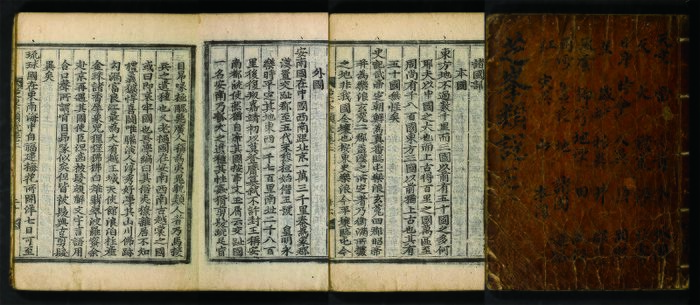 |
Title | |
| English | ||
| Chinese | 芝峯類說 | |
| Korean(RR) | 지봉유설(Jibongyuseol) | |
| Text Details | ||
| Genre | Literati Writings | |
| Type | ||
| Author(s) | 李睟光 | |
| Year | ||
| Source | ||
| Key Concepts | ||
| Translation Info | ||
| Translator(s) | Participants of 2018 Summer Hanmun Workshop (Advanced Translation Group) | |
| Editor(s) | ||
| Year | 2018 | |
Introduction
Original Script
| Image | Text | Translation |
|---|---|---|
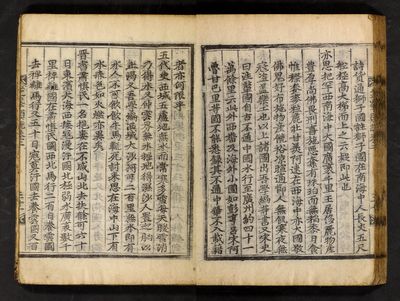
|
36. 亦思把罕。西南海中大國。廣袤千里。王居侈麗。物産豐厚。尚佛畏刑。喜施惡奪。有珠珀而無稻黍。日食惟穄麥。麥粒麤壯甘美。阿速在西海中。亦大國。敬佛鬼好布施。物産饒裕。凉暄適節。人無飢寒。夜無寇盜。蓋樂土也。以上諸國。出吾學編等書。又宋史曰。注輦國。自古不通中國。水行至廣州。約四十一萬餘里云。此外西番及海外小國。如彭亨,呂宋,阿魯甘,巴里等國。不能悉錄。其不通中華。不入載籍者。亦何限乎。 37. 五代史。西域五盧地無水。而常寒多雪。每天暖雪消。乃得水。又仲雲界無水。掘地得濕沙。人置之胸以止渴。又吾學編。西域大沙河可二百里無水。卽有水。人不可飮。飮牛馬輒死。討來思在海中。山下有水。赤色如火燃。亦異矣。 38. 晉書。肅愼氏。一名挹婁。在不咸山北。去扶餘可六十日。東濱大海。西接寇漫汗國。北極弱水。廣袤數千里。裨離國。在肅愼氏國西北。馬行二百日。養雲國。去裨離馬行又五十日。寇莫汗國。去養雲國又百 |
37. In the History of Five Dynasties (五代史), five lands of Lu 盧[1] in the Western region “have no water, are always cold and have lots of snow. Every time the weather gets warm, the snow disappears and water is obtained from this."[2] The Zhongyun 仲雲[3] region has no water, either. One can get moist sand by digging the ground, which he can place on the chest to quench thirst. Also in Zheng Xiao's (鄭曉, 1499-1566) “Wuxuebian“ 吾學編 (ca. 1522), the great sand river of the West can be 200-li without water. Even if there is water, people cannot drink it. Feeding it to horses and cattle will always kill them. Taolaisi 討來思 is located in the middle of the sea. There is water beneath the mountain that is red in color like burning fire. This is also unusual. 38. In the Book of Jin (晉書), the Sushen 肅愼 tribe, Yilou 挹婁 by another name, resides at the north of Buxian 不咸 Mountain. Going there from Buyeo 扶餘 can take sixty days. To the East, it is adjacent to the great sea. To the West, it shares borders with Koumanhan 寇漫汗 state. To extreme north is Ruoshui 弱水. The area is thousands of [square] li. The state of Bei’er 裨離 is located to the northwest of the state of Sushen. By horse it takes 200 days. The state of Yangyun 養雲 is another 50-day distance by horse from Bei'er. The state of Kou-Mohan is another 100-day distance from the state of Yangyun 養雲.
|
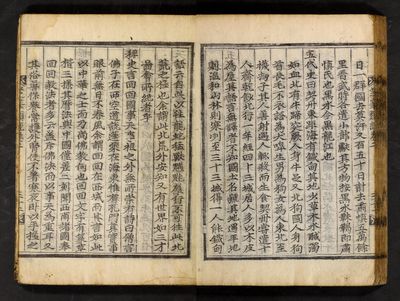
|
日。一群國。去莫汗又百五十日。計去肅愼五萬餘里。晉武時各遣小部。獻其方物。按黑水靺鞨。卽肅愼氏也。黑水。今黑龍江也。 39. 五代史曰。契丹東距海有鐵甸。其地少草木。水鹹濁如血。北有牛蹄突厥。人身牛足。又北狗國。人身狗首。長毛不衣。語爲犬嗥。生男爲狗女爲人。東北至襪劫子。其人善射。遇人輒殺而生食。契丹嘗遣十人。齎乾麨北行一年。經四十三城。居人多以木皮爲屋。其語言無譯者。不知國土名號。其地遇平地則溫和。山林則寒冽。至三十三城。得一人能鐵甸語云。自此以往。龍蛇猛獸魑魅群行。不可往。此北荒之極也。余謂此北荒外。安知又有世界。如三才圖會所紀者乎。 40. 稗史言回回國。事天事祖之外。無所崇。有詩曰僧言佛子在西空。道說蓬萊在海東。惟有孔門眞實事。眼前無日不春風。余謂回回在西域。而其言如此。以中華之士。而乃尚佛敎何也。回回文字。有篆草楷三樣。其曆法與中國僅差二刻。聞西南諸國。奉回回敎法者多云。蓋斥佛法而以事天爲重耳。又其俗善保養。常護外腎。使不着寒。夜臥以手握之 |
The state of Yiqun 一群 is another 50-day distance from Mohan. Estimated distance from Shushen is over 50,000 li. During the reign of Jin Wudi (266-290), they each dispatched Xiaobu 小部 to pay tributes of local products. Adjacent to Mohe 靺鞨 of Hesui 黑水 (Black Water) is the Sushen 肅愼 tribe. Hesui is today’s Helungjiang (Black Dragon River). 39. It says in the History of the Five Dynasties, “In the sea to the east of Khitan 契丹 is Tiedian 鐵甸. ... Its land has little plants. The water is salty and dirty as blood.”[4] “To the north there are Niuti Tujue 牛蹄突厥 (Ox-hoof Turks), with human bodies and ox-hooves.” [5] ”And in the Gouguo 狗國 (Dog-land) in the north, [people] have human bodies and dogs’ heads, are long haired and unclothed. Their language is a canine haul. At birth, the men become dogs and women become humans.” [6] ”To the northeast, one reaches Wajieji 襪劫子—its people are good archers. If they meet a person, they immediately kill him and eat him raw.”[7] "Khitan had dispatched ten people. Carrying dry barley powder, they traveled north for one year, past forty-three cities. Many residents used barks of trees for housing. As there was no interpretor of their language, the names of the country were unknown. Their land bordering the plane was temperate and [the land bordering] the forest was cold and chilly. When they reached thirty-third city, they got one man who could speak Tiedian language. ‘From this point on, even a group of dragons, serpents, birds of prey, and chimei 魑魅 will not be able to go [any further].' Its north is an extremity of wasteland.” I call this the Northern steppes (北荒外: lit., ”beyond the northern wasteland”). How could one know there is another world there? Such is what is recorded in Sancai tuhui 三才圖會. |
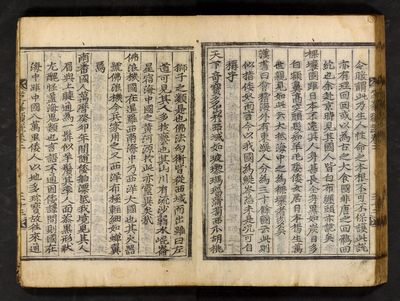
|
令暖。謂此乃生人性命之本根。不可不保護。此說亦有理。回回或以爲古之大食國。非唐之回鶻,回紇也。余赴京時。見其國人。皆白布纏頭。亦詭矣。 41. 裸壤國。距日本不遠。其人身甚長。全身黑如炭。目多白。額鼻高突。頭髮如羊毛。娶倭女居日本。楊生萬世親見如此云。大抵海中之爲裸壤者多矣。 42. 漢書曰。會稽海外。有東鯷人。分爲三十餘國云。此則似指倭奴而言。今以我國爲鯷岑。恐未是。況可自稱乎。 43. 天下奇寶。多出於西域。如玻瓈瑪瑙葡萄西瓜胡桃獅子之類是也。佛法幻術。皆從西域而出。雖曰左道。可見其人多技藝也。其山川。有流沙,弱水,崑崙,星宿海。中國之黃河源於此。亦靈異矣哉。 44. 佛浪機國。在暹羅西南海中。乃西洋大國也。其火器號佛浪機。今兵家用之。又西洋布極輕細。如蟬翼焉。 45. 南番國人。萬曆癸卯年間。隨倭舶漂抵我境。見其人。眉與上睫通爲一。髯似羊鬚。其率人面漆黑。形狀尤醜怪。蓋海鬼類也。言語不通。因倭譯問。則國在海中。距中國八萬里。倭人以地多珍寶。故往來通 |
(translation) |
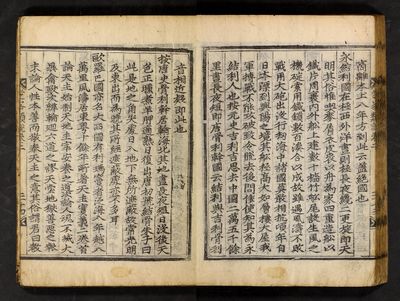
|
商。離本土八年。方到此云。蓋絶國也。 46. 永結利國。在極西外洋。晝則極長。夜纔二更。旋卽天明。其俗惟喫麥屑衣皮裘。以舟爲家。四重造船。以鐵片周裹內外。船上建數十檣竹。船尾設生風之機。碇索用鐵鎖數百湊合以成。故雖遇風濤不敗。戰用大砲。出沒行劫。海中諸國。莫敢相抗。頃年。自日本漂到興陽之境。其船極高大。如層樓大屋。我軍搏戰。不能攻破。致令脫去。後問倭使。知其爲永結利人也。按元史。吉利吉思去中國二萬五千餘里。晝長夜短。卽唐骨利幹國云。結利與吉利骨利音相近。疑卽此也。 47. 按唐史。骨利幹居翰海北。其地晝長夜短。日沒後天色正曛。煮羊胛適熟。日復出。唐初。號結骨。朱子曰。此是地之角尖處。日入地下。無所遮蔽。故常光明。及東出而爲曉。其所經遮蔽處。亦不多耳。 48. 歐羅巴國。亦名大西國。有利瑪竇者。泛海八年。越八萬里風濤。居東粤十餘年。所著天主實義二卷。首論天主始制天地。主宰安養之道。次論人魂不滅。大異禽獸。次辨輪廻六道之謬。天堂地獄善惡之報。末論人性本善而敬奉天主之意。其俗謂君曰敎 |
(translation) |
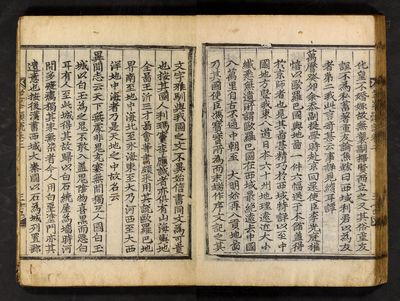
|
化皇。不婚娶故無襲嗣。擇賢而立之。又其俗重友誼。不爲私蓄。著重友論。焦竑曰。西域利君以爲友者第二我。此言奇甚云。事詳見續耳譚。 49. 萬曆癸卯。余忝副提學時。赴京回還使臣李光庭,權憘。以歐羅巴國輿地圖一件六幅送于本館。蓋得於京師者也。見其圖甚精巧。於西域特詳。以至中國地方曁我東八道,日本六十州。地理遠近大小。纖悉無遺。所謂歐羅巴國。在西域最絶遠。去中國八萬里。自古不通中朝。至 大明始再入貢。地圖乃其國使臣馮寶寶所爲。而末端作序文記之。其文字雅馴。與我國之文不異。始信書同文。爲可貴也。按其國人利瑪竇,李應誠者。亦俱有山海輿地全圖。王沂三才圖會等書。頗采用其說。歐羅巴地界。南至地中海。北至冰海。東至大乃河。西至大西洋。地中海者。乃是天地之中故名云。 50. 異聞志云天下無處非鬼充塞無間。獨互人國白玉城。以白玉爲之。鬼不敢入。蓋鬼陰物。喜黑而惡白耳。有人至此城得其故。歸以白石繞屋爲墻。時河間多疫癘。獨其家無染者。今人用白堊塗門。亦其遺意也。按後漢書。西域大秦國。以石爲城。列置郵 |
(translation) |
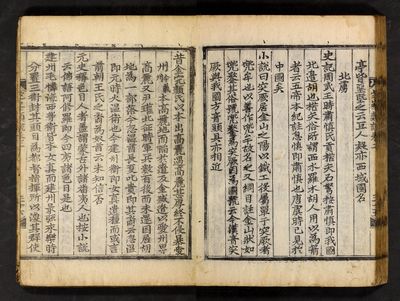
|
亭。皆堊墍之云。互人。疑亦西域國名。 |
(translation) |
- ↑ also written as 吾盧, Yīwú 伊吾 or Yīwúlú 伊吾卢
- ↑ 新五代史, Book 74. "Appendix on Four Barbarians" (四夷附录), 3: 34 https://ctext.org/wiki.pl?if=en&res=626823&searchu=%E5%A4%9A%E9%9B%AA&remap=gb
- ↑ See https://en.wikipedia.org/wiki/Hami https://zh.m.wikipedia.org/wiki/仲云国
- ↑ 新五代史, Book 73. "Appendix on Four Barbarians" (四夷附录), 2: 14 https://ctext.org/wiki.pl?if=en&chapter=158998&remap=gb#p15
- ↑ 新五代史, Book 73. "Appendix on Four Barbarians" (四夷附录), 2: 15 https://ctext.org/wiki.pl?if=en&chapter=158998&remap=gb#p16
- ↑ Ibid.
- ↑ Ibid.
